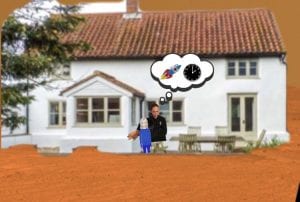The Bittering family in Ray Bradbury’s science fiction short story, “Dark they were, and Golden Eyed” are recolonizing on the planet Mars. Nuclear war broke out on earth and humans were in desperate need of safety. Individuals experience conflicts that they must overcome in order to adjust to their new lives on mars. Change is difficult but many are forced to do so in order to seek safety. The literature picture project displays different literary elements that make up the story. Various photos are able to provide context to each quote that pertains to a particular moment in the short story.
1) Exposition:
“He picked up the luggage in his cold hands. ‘Here we go,’ he said- a man standing on the edge of the sea, ready to wade in and be drowned” (Bradbury 1).
Exposition is at the beginning of the story when the author gives the reader information about the background of the characters and the setting. This is the start to the Bittering’s new lives on Mars. Mr. Bittering seemed to be optimistic yet slightly nervous about their new home.
2) Rising action #1:
“Mother, Father- the war, Earth!’ she sobbed. ‘A radio flash just came. Atom bombs hit New York! All the space rockets blown up. No more rockets to Mars, ever'” (Bradbury 2).
The first set of events leading to the climax of the story. Clearly, this is the first problem that the Bittering family were faced with. They were at a point of no return. They are now forced to live permanently on Mars. They reader is now intrigued because they wonder what is going to happen next.
3) Rising action #2:
“… And the lawn in front of their house…was colouring itself, like spring violets. Seed from earth but growing up a soft purple” (Bradbury 5).
The second rising action is another suspenseful event that occurs leading to the climax. When the reader finds out that the grass is beginning to change colour they are confused and are forced to wonder what is going to happen next.
4) Climax:
“Laura, Tim, and David carried packages. Or, as they preferred to be known, Ttil, Linnl, and Werr carried packages” (Bradbury 10).
The climax of the story is the most intense point of the story. Through out the story the reader was built up by the rising action to believe that the Bittering’s were turning into aliens. Mrs. Bittering and her children began to adapt and changed their names to alien like names.
5) Falling action:
“Looking at the small white cottage for a long moment, he was filled with a desire to rush to it, touch it, say goodbye to it, for he felt as if he were going away on a long journey, leaving something to which he could never quite return, never understand again” (Bradbury 11)
The Falling action to a story is the set of events that follow the climax. Mr. Bittering is leaving his families house on Mars as they head for the hills. His family had completely adapted to their new world and Mr. Bittering was finally accepting his fate although he did not want to.
6) Conclusion:
“‘The town’s empty, but we found native life in the hills, sir. Dark people. Yellow eyes. Martians. Very friendly. We talked a bit, not much. They learned english fast. I’m sure our relations will be most friendly with them sir'” (Bradbury 12).
The conclusion to a story sums up and ties the story together to an end. People from earth came back to end save the earthlings living on mars, but the town was barren. The luitenant and kernel met martians on the hill, it was actually the Bitterings plus the other humans who recolonized on earth.
7) Physical Setting:
“Earth people left to the strangeness of mars, the cinnamon dusts and wine airs, to be baked like gingerbread shapes in martian summers, put into harvested storage by martian winters.” (Bradbury 3).
The time and place where the story takes place. It provides context to the reader so that they can can put themselves within the story. The description of the martian seasons gives you the orange/red colour of the dust on the surface of the planet as well as the super cold nights and winters. The extra descriptive words like cinnamon and wine helps you to be able to close your eyes and visualize actually being there.
8) Emotional Setting:
“The fear would not be stopped. It had his throat and heart. It dripped in a wetness of the arm and the temple and the trembling palm” (Bradbury 7).
The emotional setting of the story also provides context and helps the reader better understand each situation that occurs within the story. All throughout the short story Mr. Bittering is stressed and it is shown his fear and panic when he finds that their garden has transformed. Mood words such as fear display the characters feelings during conflicts and problems.
9) Conflict Type:
“He looked with dismay at their house. ‘Even the house. The wind’s done something to it. The air’s burned it. The fog at night. The boards, all warped out of shape. It’s not an Earthman’s house any more.’ ‘Oh, your imagination!’ He put on his coat and tie. ‘I’m going into town. We’ve got to do something now. I’ll be back.'” (Bradbury 5).
There are two different types of conflict one being internal and the rest are considered external conflicts. Conflicts can arise at any moment in a short story between a group or an individual. Mr. Bittering had a conflict within himself; He had an internal conflict. Everyone else on mars was adapting just fine into their new lives, but as soon as Mr. Bittering found out that there was no return he went a little bit crazy. He would get upset with his wife for adapting so quickly into the new environment.
10) Ending Type:
“‘What do you think of naming those mountains the Lincoln Mountains, this canal the Washington Canal, those hills – we can name those hills for you, Lieutenant. Diplomacy. And you, for a favour, might name a town for me. Polishing the apple. And why not make this the Einstein Valley, and further over … are you listening, Lieutenant?’ … ‘What? Oh, yes, Sir.’” (Bradbury 12)
The ending type to a story is how the story finishes. Readers can end up happy, sad, confused, and or shocked. In the short story the ending was partly expository happy but you are also partly left with a small cliffhanger. As the reader knows the Bittering family adapted and transformed into martians. In the last page and a half two new characters are introduced from earth. The last few sentences leave the reader to make their own assumptions about what now happens to the new humans on mars
11) Irony:
“He saw their skin baking brown. And he saw the yellow eyes of his wife and his children, their eyes that were never yellow before” (Bradbury 8)
There are three types of irony. There is verbal, dramatic, and situational. Dramatic irony is when the reader knows something that the character in the story doesn’t know. We as the reader know that the Bitterings are beginning to transform into aliens but they themselves are not aware. Mr. Bittering is confused by the new dark skin tone as well as the yellow specks in their eyes.
12) Suspense:
“Alone, thought Bittering. Only a thousand of us here. No way back. No way. No way. … He stroked Laura’s head against him and said, ‘The rockets will get through, some day.’ ‘In five years maybe. It takes that long to build one. Father, Father, what will we do?'” (Bradbury 3).
Suspense gives the reader a feeling uncertain, excited, or anxious about a certain situation that is about to occur. The Bitterings were at a point of no return and this creates a large dilemma for Mr. Bittering. He is forced to figure out a plan for his family to return to mars without any spaceships coming to rescue them.
13) Characterization Example:
“‘I feel like a salt crystal,’ he often said, ‘in a mountain stream, being washed away. We don’t belong here. We’re Earth people. This is Mars. It was meant for Martians. For heaven’s sake, Cora, let’s buy tickets for home!'” (Bradbury 2).
Characterization is how the author describes the character to the readers. There are two types of characterizations, indirect and direct. An indirect characterization of Mr. Bittering is applied by his speech, action, and affect on others. Throughout the short story Mr. Bittering seems anxious, nervous, fearful, and uncertain about his new found predicament.












